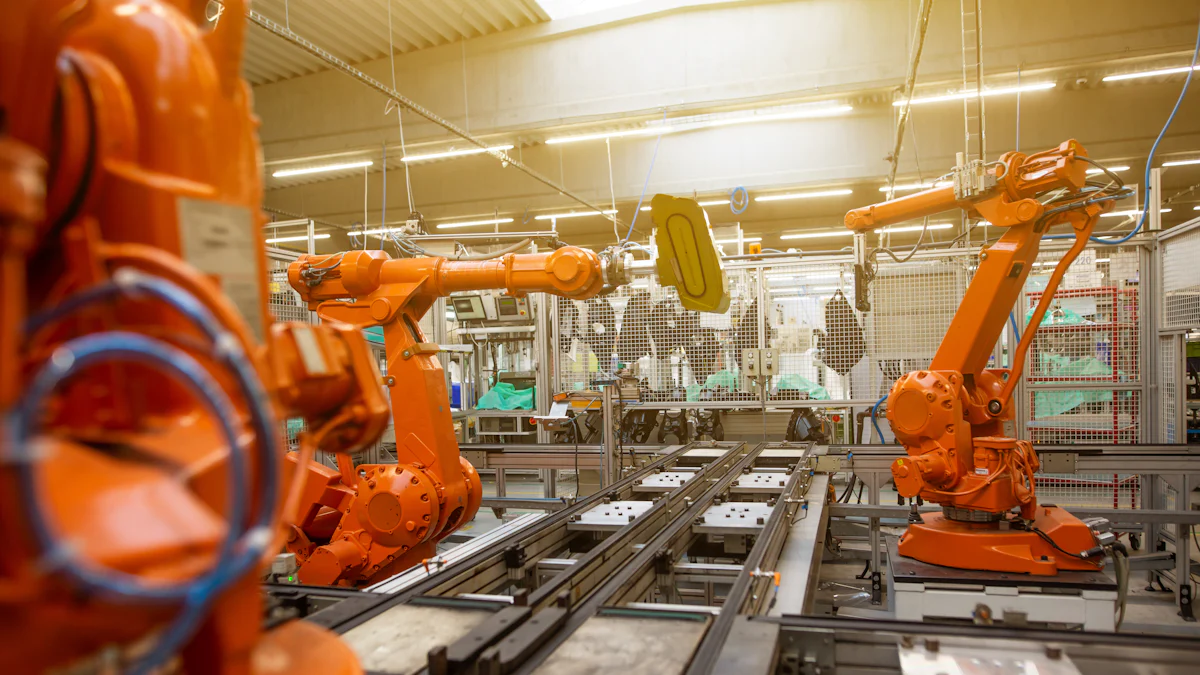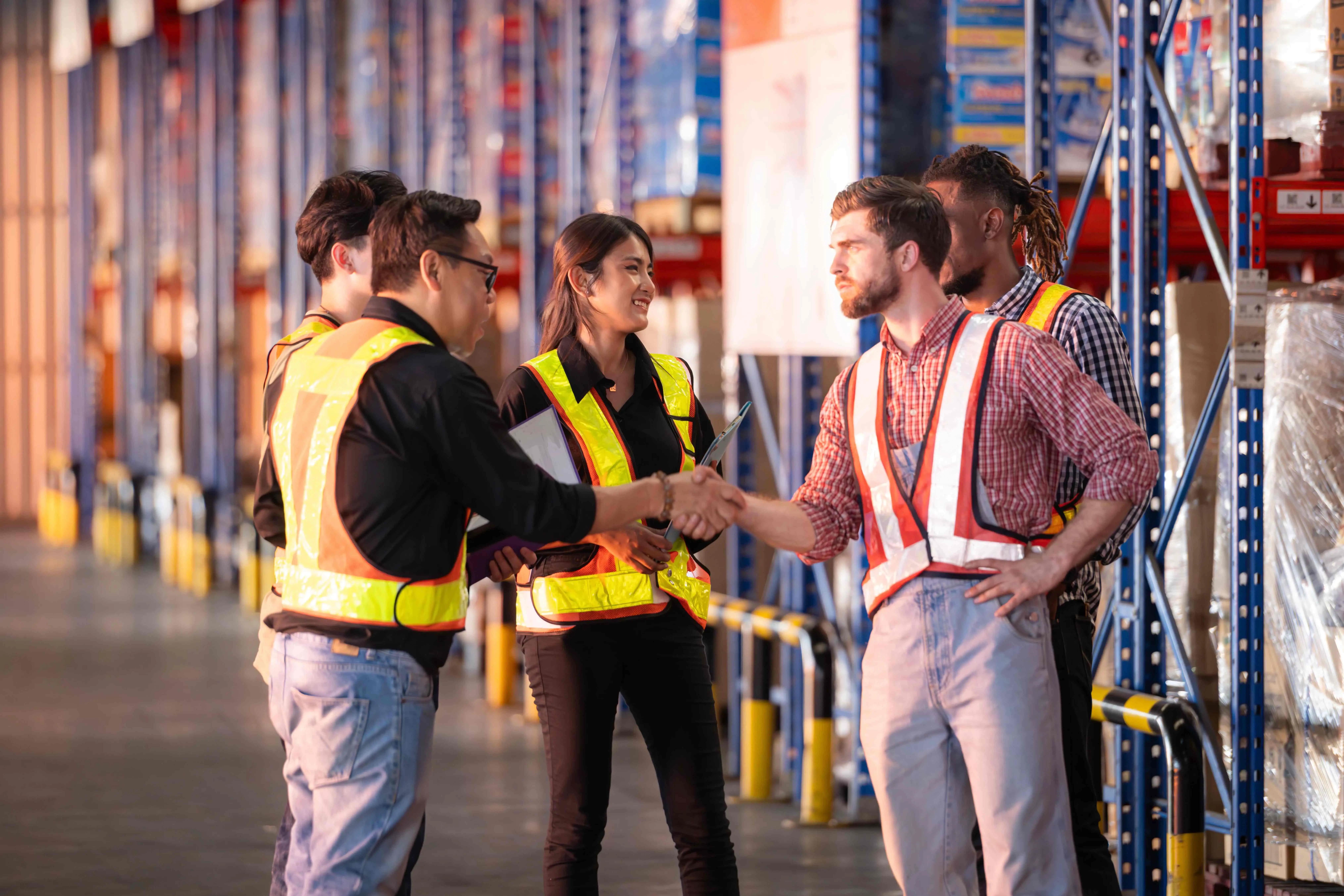How AI is Revolutionizing Logistics in 2025

Artificial intelligence is reshaping the logistics industry, unlocking opportunities for smarter operations. AI in logistics enhances demand forecasting, optimizes supply chain efficiency, and reduces costs. With the global AI market in logistics projected to grow from $18.01 billion in 2024 to $26.34 billion in 2025, you can witness its transformative impact firsthand.
Key Takeaways
AI helps logistics by predicting needs, improving supply chains, and cutting costs.
Predictive tools help businesses guess customer needs and keep enough stock.
AI tools like smart cameras and robots make warehouses safer and better.
Key Advancements in AI Technologies for Logistics

Predictive Analytics for Smarter Supply Chain Management
Predictive analytics is transforming how you manage supply chains. By leveraging AI, you can anticipate customer needs with greater accuracy. This technology enhances demand forecasting, ensuring you maintain optimal inventory levels and avoid stockouts or overstocking. It also improves transportation efficiency by optimizing routes and schedules, reducing costs while boosting customer satisfaction. Proactive risk management becomes possible as predictive analytics identifies potential issues before they disrupt operations. For example, AI-driven forecasting can reduce supply chain errors by up to 50%, leading to a 65% increase in efficiency.
Computer Vision and Automation in Warehouse Operations
Computer vision is revolutionizing warehouse operations by automating tasks and improving efficiency. This technology allows you to process orders faster and with fewer errors. It reduces costs by minimizing reliance on manual labor while enhancing accuracy in product identification. Additionally, computer vision improves safety by monitoring warehouse environments to prevent accidents. For instance, it tracks forklift operations and identifies hazards. These systems also scale operations efficiently, adapting to increased volumes without requiring proportional staff increases. Tasks like container unloading, yard management, and shipping workflows become seamless with this AI-driven innovation.
Autonomous Vehicles and Drones for Efficient Deliveries
Autonomous vehicles and drones are reshaping logistics by offering faster and more efficient deliveries. Enhanced navigation systems, powered by AI and GPS, ensure optimal routes for vehicles and drones. These advancements reduce congestion and improve delivery times. Drones now feature increased payload capacities and longer battery life, enabling them to handle larger packages over extended distances. Future trends include electric vertical takeoff and landing (eVTOL) vehicles and AI-powered fleet management systems. These technologies open up unprecedented opportunities for streamlining supply chain operations.
Natural Language Processing (NLP) for Enhanced Communication
NLP is enhancing communication across logistics operations. This technology automates customer service, providing personalized updates and answers tailored to specific needs. It also optimizes route planning and improves data analysis, reducing operational costs. NLP tools extract relevant information from unstructured data, minimizing manual entry errors. This capability proves invaluable in managing inventory levels and supplier relations. By integrating NLP, you can boost customer satisfaction through efficient and customized interactions, making logistics operations smoother and more effective.
Real-World Applications of AI in Logistics

Streamlining Warehouse Operations with AI and Robotics
AI is transforming warehouse operations by automating processes and improving efficiency. Machine learning algorithms optimize routing for warehouse picking by prioritizing orders and reducing travel time. This increases productivity and ensures faster order fulfillment. AI-driven slotting dynamically adjusts inventory placement based on spatial characteristics, saving labor costs and boosting productivity by up to 20%. Robotic process automation (RPA) handles repetitive tasks like inventory management and order processing, allowing you to focus on more complex challenges.
Computer vision enhances item recognition accuracy, speeding up picking and reducing errors. For example, Amazon uses automated picking systems powered by AI to streamline workflows. Workflow orchestration tools analyze pick rates and labor data to optimize the movement of people and totes, ensuring maximum efficiency. These advancements in AI and robotics create opportunities for seamless warehouse operations.
Application | Description |
|---|---|
Machine Learning Algorithms | Optimize routing for warehouse picking, reducing travel time and boosting productivity. |
AI-Driven Slotting | Dynamically adjusts inventory placement, saving labor costs and increasing productivity. |
Workflow Orchestration | Optimizes movement of people and totes using pick rate and labor data. |
Robotic Process Automation | Automates repetitive tasks like inventory management and order processing. |
Computer Vision | Enhances item recognition accuracy, improving picking speed and accuracy. |
Optimizing Transportation with AI-Driven Routing Systems
AI-driven routing systems are revolutionizing transportation in logistics. These systems suggest alternative routes before disruptions occur, ensuring efficient transportation planning. Real-time data helps vehicles stay on optimal routes, saving time and reducing fuel consumption. Predictive analytics anticipates traffic patterns, enabling proactive route adjustments.
Sophisticated algorithms calculate efficient routes based on travel distance, delivery windows, and fuel costs. They also handle complex multi-stop routes, reducing delivery time and costs. Intelligent fleet management systems consider vehicle capacity, fuel efficiency, and maintenance schedules to enhance operational efficiency. By prioritizing safety, AI identifies high-risk areas and adjusts routes dynamically. These trends in AI ensure higher productivity and lower costs, making transportation more resilient and efficient.
JusLink: Revolutionizing Inventory Management with AI
JusLink is redefining inventory management with its AI-powered tools. Its AI-driven sales forecasting predicts market trends with precision, helping you maintain optimal inventory levels. Intelligent replenishment management dynamically adjusts stock based on demand, reducing risks of overstocking or stockouts.
The platform’s Control Tower Intelligent Risk Management system integrates external data to monitor supply chain risks in real time. It provides timely warnings, enabling you to respond swiftly to disruptions. Automated reordering ensures efficient cargo transport by tracking shipment statuses and detecting anomalies. JusLink’s comprehensive digital supply chain management solution offers real-time inventory management, empowering you to navigate complex supply chain operations with ease.
Real-Time Visibility Across Supply Chains with JUSDA Solutions
JUSDA’s Supply Chain Management Collaboration Platform enhances real-time visibility across supply chains. It integrates AI, cloud computing, and blockchain to provide end-to-end transparency. Demand forecasting tools ensure accurate predictions, while delivery schedule coordination guarantees timely order fulfillment.
The platform’s transport coordination feature enables real-time tracking of shipments, reducing delays and improving efficiency. Customs coordination tools streamline cross-border processes, minimizing disruptions. Warehouse coordination offers dynamic inventory management, helping you optimize stock levels. These AI-driven solutions from JUSDA empower you to overcome challenges and achieve supply chain transformation.
Challenges in Adopting AI in Logistics
Addressing Data Privacy and Security Concerns
AI in logistics relies heavily on data, making privacy and security critical concerns. Protecting sensitive information, such as customer details and shipment data, is essential to maintain trust. You must ensure robust encryption and compliance with global data protection regulations. Algorithmic bias also poses risks, requiring continuous monitoring to prevent unfair outcomes.
Challenge | Description |
|---|---|
Safeguarding sensitive information is vital to maintain trust and comply with regulations. | |
Integration Issues | Ensuring compatibility between AI systems and existing logistics infrastructure can be complex. |
Scalability Concerns | AI solutions must scale with growing logistics demands without compromising performance. |
Algorithmic Bias | Monitoring algorithms is necessary to avoid biased or unfair decision-making. |
Workforce Reskilling for AI-Driven Supply Chains
The logistics industry faces challenges in preparing its workforce for AI-driven supply chains. You need to invest in reskilling programs to equip employees with digital and analytical skills. Redefining roles to complement AI capabilities enhances efficiency. Launching AI-powered training programs and personalized learning pathways ensures employees adapt to technological transformation. Fostering collaboration between human expertise and AI systems improves workflows and decision-making.
Launch AI-powered training programs to help employees learn alongside AI systems.
Provide personalized learning pathways tailored to career goals.
Implement workforce development strategies to prepare employees for AI-augmented roles.
Ethical Considerations in AI Decision-Making
AI decision-making in logistics raises ethical concerns. Lack of transparency in AI processes can hinder accountability. You must address biases in historical data to ensure fair outcomes. Balancing automated decisions with human judgment is crucial for ethical operations. Additionally, you should consider AI's impact on local communities and the environment. Establishing clear accountability for AI-generated decisions ensures trust and fairness.
Transparency in AI processes builds accountability.
Addressing biases in data ensures fair outcomes.
Balancing automation with human judgment promotes ethical decision-making.
Considering environmental and community impacts enhances sustainability.
Overcoming Integration Complexities in Supply Chain Management
Integrating AI into supply chain management presents several challenges. Legacy systems often lack compatibility with modern AI solutions, requiring significant upgrades. Managing diverse data sources and formats is essential for effective AI implementation. You must also address skill gaps by investing in training programs. A clear transformation strategy aligns AI initiatives with organizational goals, ensuring long-term success.
Data inaccessibility limits AI's decision-making capabilities.
Functional silos reduce AI's effectiveness by isolating data.
Legacy systems complicate integration and require modernization.
A lack of stakeholder commitment can hinder AI adoption.
By addressing these challenges, you can unlock the full potential of AI in logistics, driving resilience and transformation across the supply chain.
AI as the Catalyst for Change: Future Implications in Logistics
Driving Sustainability with AI-Optimized Resource Management
AI is transforming logistics by driving sustainability through smarter resource management. It enhances inventory management by predicting demand with precision, helping you maintain optimal stock levels. This reduces waste and financial losses caused by overstocking or understocking. Lower inventory levels also mean less energy consumption in warehouses, shrinking your energy footprint.
AI-powered route optimization further supports sustainability. By planning efficient delivery routes, you can reduce fuel consumption and operational costs while minimizing your ecological impact. These advancements align with global trends toward greener supply chains, making AI a key player in sustainable logistics transformation.
Enhancing Agility and Resilience in Supply Chain Management
AI strengthens your supply chain’s agility and resilience by enabling faster, smarter decision-making.
AI-driven demand forecasting helps you adjust to market fluctuations by analyzing multiple factors.
Route optimization reduces travel time and costs, improving resource utilization.
Predictive analytics anticipates disruptions, allowing you to plan contingencies effectively.
Real-time visibility tools provide instant updates on product locations, enhancing your response to supply chain disruptions.
These capabilities ensure your operations remain adaptable and efficient, even in the face of unexpected challenges.
Human-Centric AI Integration for Smarter Collaboration
AI fosters smarter collaboration by bridging gaps in fragmented logistics networks. It enhances workflows by combining human expertise with robotic precision. Robots handle repetitive or physically demanding tasks, freeing you to focus on complex decision-making.
Human-robot collaboration improves efficiency and safety in logistics operations.
AI systems streamline processes, boosting productivity and reducing errors.
This human-centric approach ensures AI implementation complements your workforce, creating a balanced and efficient logistics ecosystem.
Unlocking New Business Models with AI-Driven Innovations
AI is unlocking innovative business models that redefine logistics. Data-driven predictions enable you to anticipate disruptions and turn inefficiencies into growth opportunities. Autonomous IoT systems enhance operational efficiency, while optimized delivery routes reduce unnecessary mileage, cutting fuel costs and carbon emissions.
Emerging trends also highlight a shift toward customer-centric logistics. AI helps you tailor services to meet customer needs, ensuring faster deliveries and higher satisfaction. These innovations position AI as the catalyst for change in logistics, driving both efficiency and transformation.

JUSDA Solutions
To provide you with professional solutions and quotations.
AI is transforming logistics by automating tasks, enhancing decision-making, and optimizing operations. Tools like JusLink and JUSDA’s solutions empower you to analyze data, predict trends, and streamline processes. Embracing AI ensures you stay competitive by improving efficiency, reducing costs, and meeting customer expectations in an evolving logistics landscape.
See Also
Transforming Future Logistics Through AI Supply Chain Solutions
Exploring AI's Hidden Capabilities Within Logistics Management
Innovative Technologies Shaping the Future of Logistics
